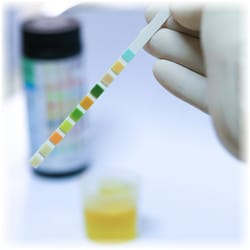What Does Your Urine Reveal About Your Health?
 “Your urine can identify more than the last thing you had to drink. In fact, urine has been used in medicine as a tool of diagnosis for thousands of years and can help provide answers to questions you may have about your health,” says Jorge Mario Echeverri MD, PIH Health Family Medicine. “Your body produces urine as a way to dispose of electrolytes, waste and extra water that it doesn’t need.”
“Your urine can identify more than the last thing you had to drink. In fact, urine has been used in medicine as a tool of diagnosis for thousands of years and can help provide answers to questions you may have about your health,” says Jorge Mario Echeverri MD, PIH Health Family Medicine. “Your body produces urine as a way to dispose of electrolytes, waste and extra water that it doesn’t need.”
When you’re hydrated and healthy, your urine color should fall in the pale yellow category. If your urine appears as a darker yellow or some other color in the rainbow, it may be a result of something you ate or a sign of a bigger concern.
What color should your urine be?
- No color or clear urine indicates that you may be drinking too much water, and while an occasional occurrence isn’t a big deal, you may be lowering salt and electrolyte levels if it’s happening more frequently. If your urine is clear and you aren’t drinking tons of water, this can be a sign of kidney problems or diabetes.
- Pale yellow urine is a great indicator that you’re healthy and hydrated. The color comes from a pigment produced by your body called urochrome. If this is your typical urine color, you’re doing a great job at staying hydrated!
- Darker yellow urine may indicate that your body is asking you to drink a glass of water. The concentrated urine is a sign of mild dehydration and can happen if you’ve been spending time outside on a hot day, or from working out.
- Pink or red urine can be caused by a food you ate—beets, blueberries and rhubarb may be the culprit. If you haven’t consumed those foods and your urine is this color, it may be a sign of:
- Orange color urine can also be a sign of dehydration or can come as a result of food dye or medication. On a more serious note, you could have a liver or bile duct disorder. It’s best to drink some water first to rehydrate, then consult with your doctor if the orange urine lingers.
- Blue or green urine is sometimes caused by a rare genetic disease linked to hypercalcemia, but more often than not, it’s a result or a food you ate or medication.
- Foggy urine comes from a urinary tract infection, kidney stones or again, can be another sign of dehydration
“Check your urine to reveal simple questions about your health and consult with your doctor for serious concerns,” says Dr. Echeverri. “Doctors can run tests on your urine and will be able to disclose more information about your health if you’re noticing extreme cases of unusual color.”
If you have questions for your physician, make an appointment to discuss your concerns, visit PIHHealth.org/Find-a-doctor.